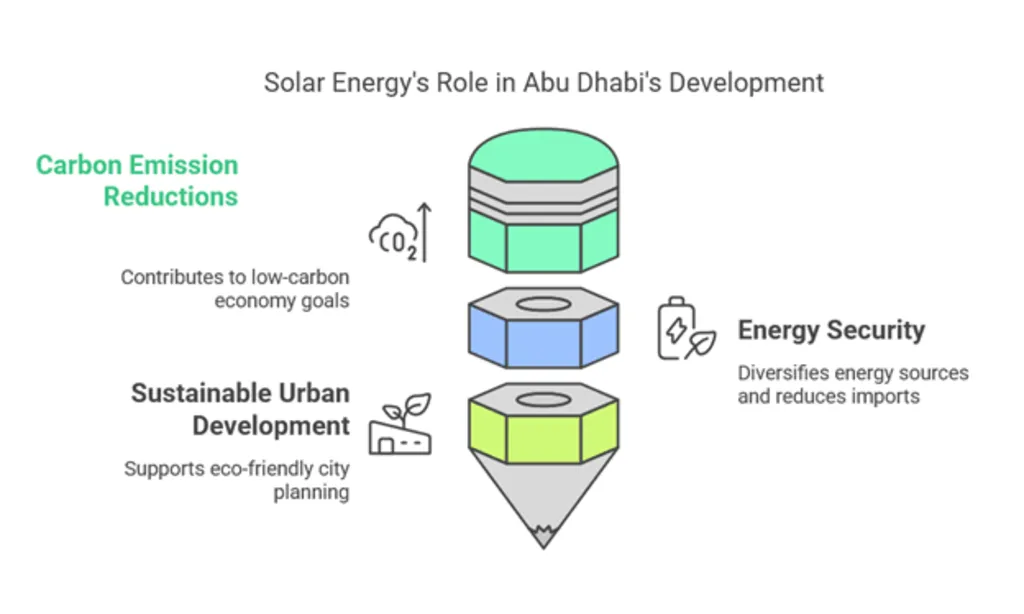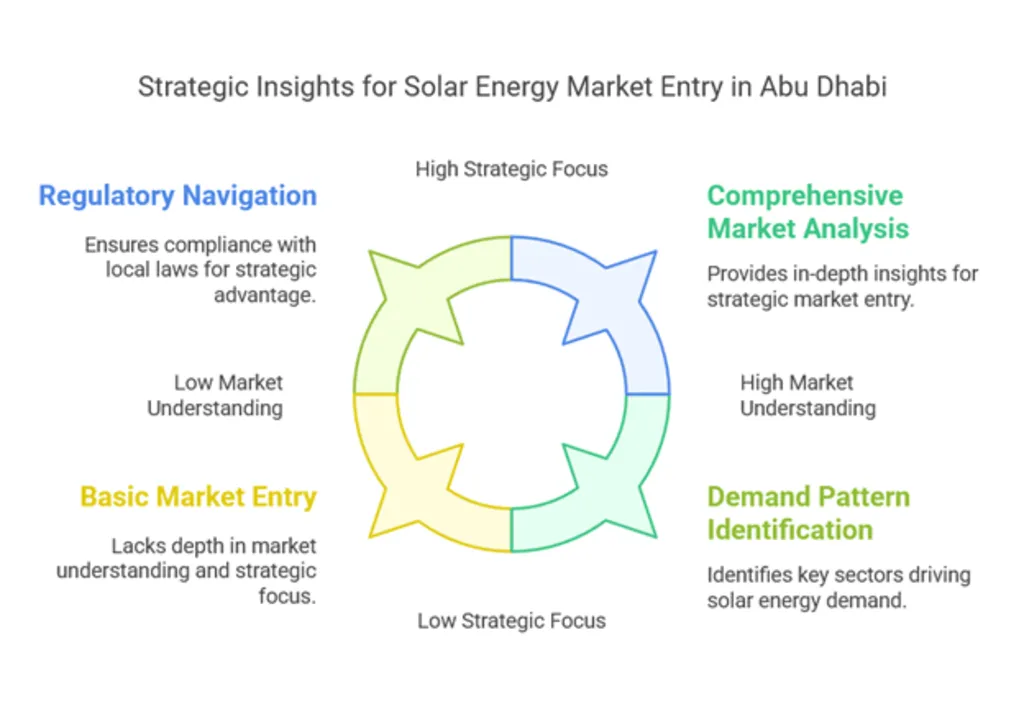Abu Dhabi has emerged as a beacon of progress in renewable energy, with solar power playing a pivotal role in its sustainability narrative. The emirate’s ambitious renewable energy agenda underscores its commitment to achieving carbon neutrality and reducing its reliance on fossil fuels. Solar energy is the cornerstone of this transition, offering a clean, abundant, and scalable alternative to conventional energy sources.
A Global Milestone: The 5.2 GW Solar Energy Plant
One of the most remarkable feats in Abu Dhabi’s renewable energy journey is the announcement of the world’s largest solar energy plant, with a staggering capacity of 5.2 gigawatts (GW). Once completed, this project will eclipse all existing solar installations worldwide, further solidifying the emirate’s leadership in renewable energy. The facility is projected to power millions of households, dramatically reducing greenhouse gas emissions and setting a benchmark for sustainable energy production.
The Role of Masdar and EWEC
Driving this groundbreaking initiative are two of Abu Dhabi’s key entities—the Abu Dhabi Future Energy Company (Masdar) and the Emirates Water and Electricity Company (EWEC). Their collaboration is a testament to Abu Dhabi’s integrated approach to achieving sustainability. The 5.2 GW plant will feature cutting-edge Battery Energy Storage Systems (BESS), a revolutionary technology designed to store excess energy and provide uninterrupted power even during periods of low sunlight. This technological leap addresses one of the most significant challenges in solar energy—intermittency.
The plant’s design also incorporates advanced tracking systems and highly efficient photovoltaic panels, maximizing energy output while minimizing land use. These innovations reflect Abu Dhabi’s vision to lead not just in scale but also in the quality of its solar energy infrastructure.
A Long History of Solar Energy Success
Abu Dhabi’s solar journey began long before the 5.2 GW project. The Noor Abu Dhabi solar plant, inaugurated in 2019, was a groundbreaking achievement in its own right. With a capacity of 1.177 GW, Noor Abu Dhabi remains one of the largest single-site photovoltaic plants in the world. It features approximately 3.2 million solar panels, which collectively reduce carbon emissions by over 1 million metric tons annually—the equivalent of taking 200,000 cars off the road.

These projects, alongside numerous smaller-scale solar initiatives, highlight Abu Dhabi’s proactive approach to renewable energy. The emirate’s long-term vision is aligned with global climate goals, such as the Paris Agreement, and its own UAE Net Zero by 2050 initiative.
The Ripple Effect: Economic and Business Opportunities
The solar energy sector’s rapid expansion in Abu Dhabi is not only an environmental triumph but also a significant driver of economic growth. For businesses and investors, this burgeoning sector offers a wealth of opportunities:
1. Boosting the Local Economy
The construction and operation of large-scale solar projects generate thousands of jobs, from engineering and procurement to maintenance and logistics. Additionally, these projects attract foreign direct investment (FDI), further stimulating the local economy. Businesses looking to capitalize on “Abu Dhabi market insights” can explore partnerships with local suppliers and service providers.
2. Catalyzing Innovation
Solar energy projects are a fertile ground for innovation, particularly in energy storage, panel efficiency, and grid integration. For tech companies and startups, Abu Dhabi’s renewable energy sector offers a platform to test and scale innovative solutions. Insights derived from “solar energy market research in Abu Dhabi” can help identify areas where technological advancements are most needed.
3. Empowering SMEs
Small and medium-sized enterprises (SMEs) have a critical role to play in Abu Dhabi’s solar energy ecosystem. From providing installation services to manufacturing components, SMEs can tap into various aspects of the solar energy value chain. Market research can help these businesses understand “how to expand into Abu Dhabi’s market” and align their offerings with local demand.
4. Strengthening Regional and Global Ties
Abu Dhabi’s solar energy projects often involve collaboration with international companies, fostering knowledge exchange and strengthening ties with global renewable energy leaders. This collaborative approach enhances the emirate’s reputation as a hub for sustainable innovation.
The Vision for a Greener Future
Abu Dhabi’s solar energy initiatives are not isolated efforts—they are part of a broader vision to transform the emirate into a global leader in sustainability. The government’s strategic frameworks, including the UAE Energy Strategy 2050, aim to increase the contribution of clean energy to 50% of the total energy mix by 2050. Solar power is expected to play a pivotal role in achieving this goal, alongside other renewable sources like wind and hydrogen.
Aligning with the UAE’s Strategic Objectives
- Carbon Emission Reductions: Solar projects contribute significantly to Abu Dhabi’s carbon reduction targets, helping the UAE transition to a low-carbon economy.
- Energy Security: By diversifying its energy mix, Abu Dhabi is reducing its dependence on imported fuels and enhancing its energy security.
- Sustainable Urban Development: The integration of solar energy into urban planning supports the development of sustainable cities, such as Masdar City, which serves as a model for eco-friendly living.

Opportunities for Businesses: A Strategic Outlook
For businesses aiming to enter or expand in Abu Dhabi’s renewable energy sector, the opportunities are immense. However, success requires a strategic approach guided by data-driven insights. Here are some actionable steps for leveraging these opportunities:
1. Collaborate with Key Stakeholders
Partnering with entities like Masdar and EWEC can provide businesses with access to resources, expertise, and networks. Market research in Abu Dhabi can identify potential collaboration opportunities and help businesses build strategic alliances.
2. Focus on Localization
Understanding the unique needs and preferences of Abu Dhabi’s market is crucial. For example, the growing demand for rooftop solar panels in residential areas represents a niche market that businesses can target.
3. Invest in Talent Development
The solar energy sector requires a skilled workforce to thrive. Businesses can contribute to talent development by offering training programs, internships, and scholarships in renewable energy disciplines. Such initiatives not only enhance brand reputation but also ensure a steady supply of skilled professionals.
4. Explore Export Potential
Abu Dhabi’s solar energy expertise is not limited to local applications—it has the potential to influence global markets. Businesses can explore export opportunities, particularly in sharing knowledge and technology with other countries in the Middle East and beyond.
Abu Dhabi as a Renewable Energy Leader?
Abu Dhabi’s solar energy sector is a testament to the emirate’s vision, innovation, and commitment to a sustainable future. From the construction of the world’s largest solar energy plant to the development of cutting-edge technologies, Abu Dhabi is setting new standards for renewable energy worldwide.
For businesses and investors, this is a moment of unparalleled opportunity. By leveraging “solar energy market research in Abu Dhabi” and aligning with the emirate’s strategic objectives, stakeholders can play a pivotal role in shaping a greener future while reaping significant economic benefits.
As Abu Dhabi continues to shine brightly on the global renewable energy map, one thing is clear—the sun is only just beginning to rise on this solar powerhouse.
How Market Insights Drive Investment Decisions in Abu Dhabi’s Solar Sector
Understanding Competitors in Abu Dhabi
Analyzing competitors is a critical aspect of entering any market. The solar energy landscape in Abu Dhabi features several established players, including Masdar and EWEC. A comprehensive “market analysis in the UAE” can help identify key competitors, understand their strategies, and uncover gaps in the market.
Identifying Demand Patterns
Market research provides valuable insights into energy consumption patterns in Abu Dhabi. By understanding which sectors (residential, commercial, or industrial) are driving demand for solar energy, businesses can tailor their strategies to meet specific needs. These insights are particularly relevant for companies exploring “business opportunities in Abu Dhabi.”
Assessing Regulatory Frameworks
Abu Dhabi’s renewable energy policies are designed to attract investments, but navigating the regulatory landscape requires a detailed understanding of local laws and incentives. Market research Abu Dhabi professionals can guide businesses through this process, ensuring compliance and maximizing returns on investment.
Spotting Emerging Trends
Solar energy technology is evolving rapidly. From advancements in photovoltaic materials to AI-driven energy management systems, staying ahead of industry trends is essential. “Solar energy market research in Abu Dhabi” can provide businesses with a competitive edge by identifying emerging technologies and market demands.
Mapping Business Expansion Strategies
For businesses planning “how to expand into Abu Dhabi’s market,” a data-driven approach is indispensable. Market insights help identify strategic locations, potential partners, and customer segments, ensuring a smooth and profitable market entry.

Why Partner with a Market Research Firm?
- Localized Expertise: Firms specializing in market research Abu Dhabi possess in-depth knowledge of the region’s dynamics, enabling businesses to navigate the market effectively.
- Data-Driven Insights: Accurate data is critical for identifying trends, understanding competitors in Abu Dhabi, and making informed decisions.
- Risk Mitigation: Market analysis in the UAE helps businesses assess risks, ensuring that investments are both strategic and sustainable.






